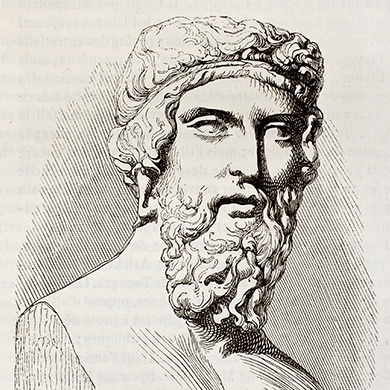

Philosophy is a broad and complex subject, encompassing an enormous amount of sub-disciplines. For example, while moral philosophy is concerned with what’s right, epistemology focuses on the nature of knowledge. Metaphysics, on the other hand, deals with determining what exists.
However, you don’t need to do a Ph.D. to obtain a grasp of philosophy that’s adequate for engaging people at a dinner party, impressing co-workers, and helping you understand the universe a little bit better.
Here’s a layperson’s explanation of the fundamental philosophical theories you should know, along with some ideas for how you can use them in your manifestation work.
 Plato’s Allegory Of The Cave
Plato’s Allegory Of The CaveOriginating in Plato’s The Republic, the cave allegory aims to make a key point about the unreliability of human perception.
In the scenario described a group of individuals chained up inside a cave initially come to believe that the shadows on the wall are entities in and of themselves. In reality, of course, the shadows are there because of the prisoners’ bodies. Plato intended to convey that we can sometimes have an entirely inaccurate perception of the world around us. We need to be open to shifting that perception if we ever want to make contact with reality.
Keep this notion in mind on your Law of Attraction journey. Often, it’s your old conceptions of yourself and the world that stop you from living the life you desire.
One of the most attractive aspects of Eastern philosophy; the main takeaway from Confucianism is the existence of the Golden Rule. Simply put, this rule suggests that we should treat other people as we would like to be treated. This theory is another view that gels very well with what the Law of Attraction teaches. After all, you should expect to receive what you give.
Expounded by the famous German thinker Friedrich Nietzsche, the nihilist worldview posits that nothing about our lives has any objective meaning.
He suggests that unless we accept this truth, we can’t thrive on an individual or societal level. While this sounds rather grim on the face of it, you can also take it as an invitation to embrace the notion that we have the power to determine our own meaning… And to believe that we can shape the world accordingly.
“Cogito Ergo Sum” in the original Latin, the phrase, “I think, therefore I am” is often incorporated into philosophical jokes. However, when Descartes originally said it, the context was one in which he wanted to press the reader to acknowledge the shaky foundations of our knowledge.
He thought that this, one’s awareness of our own existence, was proof of the reality of our own mind. Plus, that this might be the only thing of which we could really be sure. An important lesson to draw from the Cartesian thinking process is that we can sometimes help ourselves by looking for one solid foundational belief upon which to build the rest of our worldview.
 The Socratic Method
The Socratic MethodComing, unsurprisingly, from Socrates, the Socratic method refers to a particular way of approaching conversations.
Essentially, it involves one person presenting a hypothesis about something. Then another person asks them questions that push the first individual to defend their position. The idea is that discussing theories in this way encourages critical thought. It forces a person to think about whether their view is actually right. It also helps them to develop better hypotheses along the way.
In fact, you may have noticed that a lot of Law of Attraction experts design their exercises on the basis of the Socratic method. They may use the technique of in-depth questioning to push you to recognize (and in some cases replace) your underlying beliefs or assumptions.
Appearing in both Buddhism and Hindu traditions, the philosophical concept of karma is somewhat related to the Golden Rule of Confucianism.
The basic idea here is that if you do good things, then you will find good things happening to you. If you do negative things, you will find worse things happening to you. Once again, this is really just the Law of Attraction phrased differently!
The prominent political philosopher Jean-Jacques Rousseau did a lot of work on the nature of just ruling and on how governments should be formed. In his work “The Social Contract” he repeatedly stresses that those in power should be following the genuine will of the people (and that any government not doing this should be overthrown).
Another concept from Eastern philosophy is that of Samsara. It's the idea that we have multiple lives, and that the nature and quality of each life is partly determined by what we did in the previous one. Samsara is an extension of the idea of karma.

“Act as a virtuous person would act in your situation.”
Aristotle came after Plato. He further developed the foundational views of morality upon which a lot of modern philosophical thinking in place.
Aristotle's virtue ethics proposes many important ideas about morality. Among them is the thought that truly good people want to do the morally right thing. This is opposed to merely doing it to fit into society or to try and develop their ethical code.
Similarly, you become a good Law of Attraction practitioner when you are no longer simply doing the techniques and saying the words but actually meaning and embodying them. You should aim to truly believe what you are doing and saying.
Finally, many of you may be aware of this practice. Whether you are a beginner or just want to know more, you can discover how to master the Law Of Attraction effectively in your life with these concrete tips.
Be sure to download your free ebook today, just click here now.
